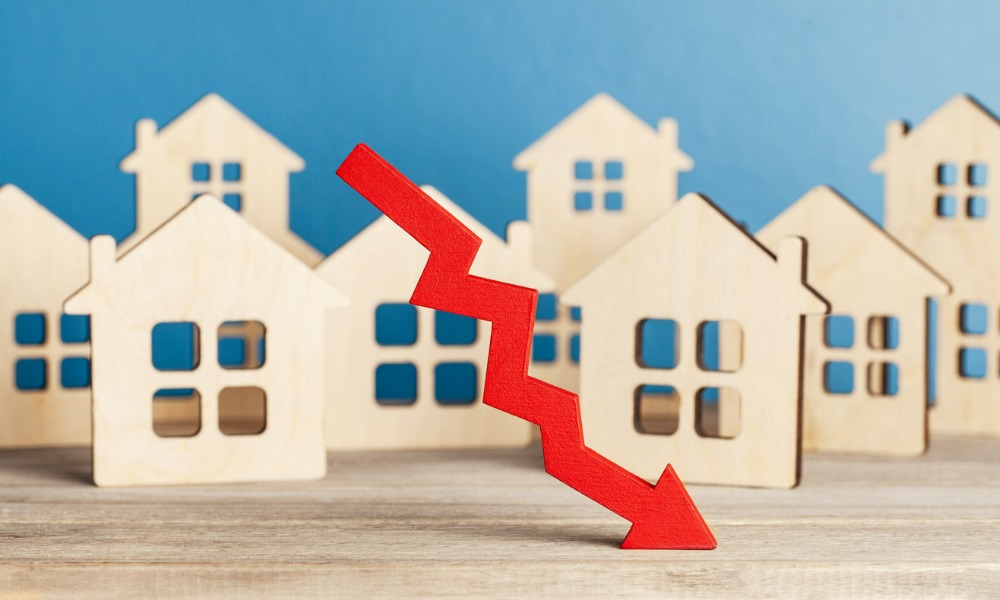Plus: How a recession could impact house prices

A recession may feel like a volatile time to purchase a property. Home prices appear to rise and fall at the drop of a hat. If you are savvy enough, however, it could be your best bet to finding a great deal. Here are the pros and cons of buying a house in a recession—and everything in between.
What is a recession?
A recession is traditionally defined as consecutive quarters of negative growth. Prior to declaring a recession, the federal government will wait for the second quarter of statistics. In recent times, such as the beginning of the COVID-19 pandemic, when economic collapse was looming, an unprecedented number of corporate bankruptcies and unemployment claims seemed inevitable. At that point, a recession was almost a guarantee, with a new recession—as well as housing market fluctuations—likely to be a casualty of market disruptions.
Is it a good time to buy a house?
Experts historically have done a poor job predicting future housing market crashes. For most of 2020 and 2021, for instance, housing costs increased dramatically; however, the federal government then hiked interest rates, therefore changing the calculations for buyers and depressing home prices. Rising interest rates force homebuyers to save money on their home purchases where possible.
Generally, purchasing a property during a recession could get you a better deal on a home. The reason for this is the number of owners or foreclosures who are forced to sell their properties to stay financially viable rises, which therefore leads to more properties becoming available on the market and lower housing prices. But because the current COVID-19-related recession is unique, each potential homebuyer is in a somewhat unprecedented financial situation. For instance, if you work in tourism or hospitality, your financial positioning will be very different from someone who is able to work from home and earn a regular, steady paycheque without any disruptions.
Read next: The cheapest places to buy a house in Canada
What impact does a recession have on house prices?
Recessions usually depress prices in almost every market—and the real estate market is no exception. Poor economic conditions typically mean there are fewer potential homebuyers with disposable income. When demand for properties drops, home prices go with it, and income generated from real estate stalls. This scenario is common, but it is still merely a general rule. It is also possible that during a recession housing prices do not rise or fall at all, but experience volatility in either direction.
The pros of buying a house during recession
Do not fret. There are pros of buying a housing during a recession. The following are some definite benefits that you can consider:
Lower prices. There are usually fewer homebuyers during a recession, which means that properties remain on the market for longer. It also means that sellers are more likely to drop their listing prices, making their property easier to sell. This scenario could mean that you find your dream home with a lucky bid at an auction, for example.
Lower mortgage rates. During a recession, it is common for interest rates to be lowered as a means of stimulating the economy. Major banks often follow suit—including by lowering mortgage rates. That means with a lower mortgage rate you will wind up paying less for your home in the long run. It is also likely to give you significant savings, depending on how low the mortgage rate goes.
Seller concessions. A property that sits on the market a long time usually makes sellers skittish. You can take advantage of this by requesting concessions like asking the seller to pay for closing costs, for example.
The cons of buying a house during recession
Buying a house during a recession also comes with its downsides. Some things that you should consider when deciding to purchase a property in the middle of a recession include:
Job uncertainty. During typical recessions, unemployment rates can skyrocket, with a lot of jobs on the chopping block, or at least in danger of cutbacks. As the COVID-19 pandemic showed with the hospitality industry, your job situation can change quickly, no matter how secure you think your position or industry. It is also important to keep in mind that your mortgage is one of many costs that come with owning a home. To avoid a situation where you are forced into a foreclosure, ensure first and foremost that you have job security.
Read more: Closing costs: What are they and how are they estimated?
Banks are less likely to lend money. Economic uncertainty can impact anyone’s job—and banks understand this. For fear of having to foreclose your home, lenders are less likely to approve mortgages in this economic environment.
Title issues. Title issues could potentially impact your property purchase if the current owners you are buying from go deep into debt. It is important, for this reason, to ensure your title company’s search is thorough.
Possible difficulty selling your home. Selling during a recession could be a problem if you need to sell your current home before buying a new one. Due to the recession, you could get less money than you expected, or your house could languish on the market, depending on your location.



